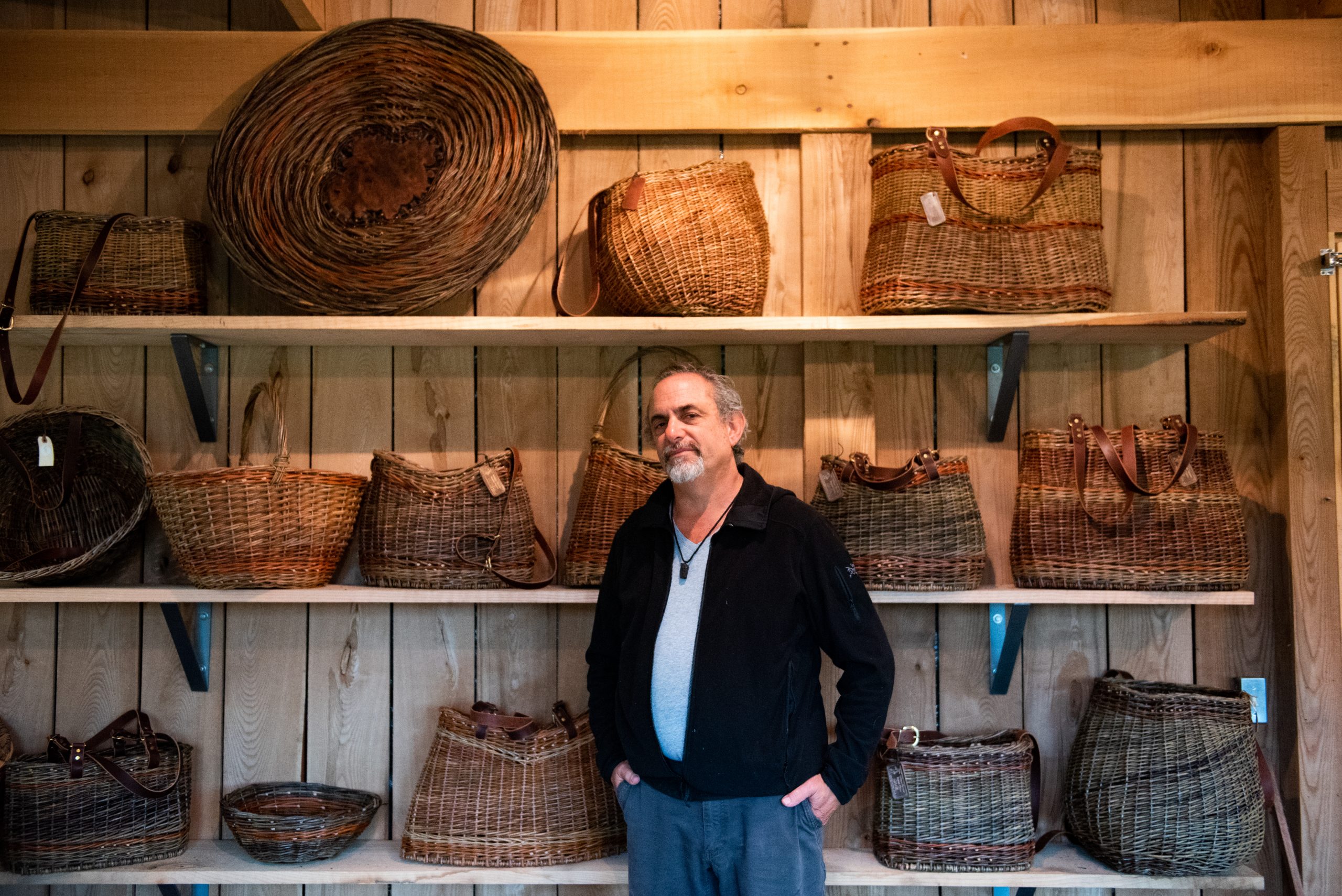Howard Peller remembers thousands of workers weaving baskets as one in a huge warehouse. That was in the heydey of the Longaberger Company, a billion-dollar basket maker based in Dresden.
“To see 2,000 people weaving was pretty cool,” Peller, who was once the director of design for the company, recalls. “It was like a bee hive.”
The days of mass-producing baskets in the region are long gone: After a long decline, Longaberger ceased operations in early 2018. Today, Peller weaves baskets by hand from ingredients he grows on his farm near Roseville.
He doesn’t know of many other weavers left in the area.
Peller’s careful and studious work is a far cry from the huge amount of collectible baskets that Longaberger once churned out. The massive company’s legacy can be seen across Muskingum and Licking Counties.
Outside of Frazeysburg, the company’s manufacturing buildings sit empty; in Dresden, the “world’s largest basket,” a work created by Longaberger weavers, is beginning to rot; and in Newark, paint on the company’s iconic basket-shaped headquarters is fading.
Weaving dreams
Longaberger was founded in 1973 as a little weaving shop in Dresden. It’s founder, trailblazer and visionary Dave Longaberger, led the company to massive success.
In 2000, a year after his death, Dave Longaberger’s company peaked in value at $1 billion. At its height, the Longaberger Company provided jobs to nearly 8,000 in what was once a poor region.
Geoff Snyder still sells the company’s baskets. He started selling them as “The Basket Guy” during the recession of 2008 and found that there was still a huge demand for the baskets.
“A large majority of my sales are online,” Snyder says. “There are collectors all over the country that I sell to.”
While Snyder found employment through the recession by selling baskets, the Longaberger Company was mortally wounded by the economic downturned. Peller says the recession, combined with a change in home decor tastes, led to the company’s eventual bankruptcy and collapse.
“I designed a lot of functional work for Longaberger,” Peller said. “People collected, and had different fabrics and matched (baskets) up in their homes. I don’t think people are using baskets a lot in their life.”
In addition to teaching people new skills and providing employment, Longaberger gave the area something to be proud of, Peller says.
“It was a source of pride for people,” he says. “They did something successful with their hands. People made a good living, it was good work and had good benefits. When you lose that, it’s difficult.”
An old tradition
Since his time at Longaberger ended, Peller has become an expert on willow. He uses the hearty plant to create living fences and other structures in addition to weaving its sticks into baskets.
Demand for his services are high. In December, he’ll head to Chelsea in New York City to decorate a penthouse with his willow. He previously created a sculpture out of willow in Rockefeller Plaza.
“It’s a great biodiverse plant,” Peller says. “It really has a positive effect on the environment.”
Peller uses techniques from across the globe. He spent two summers living with local artisans near the headwaters of the Amazon River in South America. He’s also worked in Haiti over the course of three years.
Longaberger wasn’t the first basket company in southeast Ohio. Peller says that farms across the region wove their own baskets, either from willow or wooden splints. It’s a tradition that has largely been forgotten, save for Peller’s basket farm.
“They planted the material and wove with it,” Peller says. “Most people don’t even remember that.”
Southeast Ohio has a rich artisan tradition, Peller says. When he purchased his farm, it was adjacent to two massive pottery producers. While he and his wife still have a pottery studio, that tradition has also begun to fade.
A future for baskets
No one weaves for Longaberger anymore, but some are finding new opportunities in Dresden.
The town never gave up on baskets. Snyder is only one of many local retailers who’ve based their business around Longaberger. While Snyder says he’ll always be loyal to Longaberger, he’s excited about a new company that is trying to revive the company’s legacy.
Dresden and Company is a smaller operation that Longaberger was, only employing about ten weavers, but it has proprietors like Snyder excited.
“They’ve kind of arisen from the ashes,” Snyder says. “It would be silly to not support a local company.”
Some in Dresden are hoping that Longaberger will one day return to the region. In 2019,
Longaberger changed the landscape of Dresden and Muskingum County forever. Weavers like Snyder and sellers like Snyder alike say they’re grateful for the opportunities the company provided while it was still around.
Bennett Leckrone
Related posts
What’s Inside
- Behind the Bite (68)
- Features (124)
- In Your Neighborhood (102)
- Photo Essay (4)
- Read the Full Issue (8)
- Talking Points (48)
- The Scene (15)
- Uncategorized (3)
- Web Exclusive (5)
- What's Your Story? (21)


Find us on Social Media